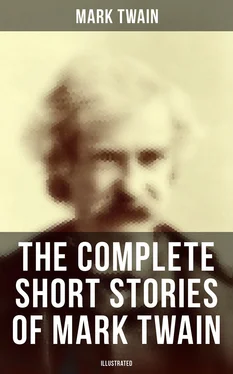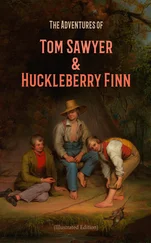The man was not in uniform, and was not armed. He was a stranger in the country; that was all we ever found out about him. The thought of him got to preying upon me every night; I could not get rid of it. I could not drive it away, the taking of that unoffending life seemed such a wanton thing. And it seemed an epitome of war; that all war must be just that -- the killing of strangers against whom you feel no personal animosity; strangers whom, in other circumstances, you would help if you found them in trouble, and who would help you if you needed it. My campaign was spoiled. It seemed to me that I was not rightly equipped for this awful business; that war was intended for men, and I for a child`s nurse. I resolved to retire from this avocation of sham soldiership while I could save some remnant of my self-respect. These morbid thoughts clung to me against reason; for at bottom I did not believe I had touched that man. The law of probabilities decreed me guiltless of his blood; for in all my small experience with guns I had never hit anything I had tried to hit, and I knew I had done my best to hit him. Yet there was no solace in the thought. Against a diseased imagination, demonstration goes for nothing.
The rest of my war experience was of a piece with what I have already told of it. We kept monotonously falling back upon one camp or another, and eating up the country. I marvel now at the patience of the farmers and their families. They ought to have shot us; on the contrary, they were as hospitably kind and courteous to us as if we had deserved it. In one of these camps we found Ab Grimes, an Upper Mississippi pilot, who afterwards became famous as a dare-devil rebel spy, whose career bristled with desperate ad ventures. The look and style of his comrades suggested that they had not come into the war to play, and their deeds made good the conjecture later. They were fine horsemen and good revolver-shots; but their favorite arm was the lasso. Each had one at his pommel, and could snatch a man out of the saddle with it every time, on a full gallop, at any reasonable distance.
In another camp the chief was a fierce and profane old blacksmith of sixty, and he had furnished his twenty recruits with gigantic home-made bowie-knives, to be swung with the two hands, like the machetes of the Isthmus. It was a grisly spectacle to see that earnest band practicing their murderous cuts and slashes under the eye of that remorseless old fanatic.
The last camp which we fell back upon was in a hollow near the village of Florida, where I was born -- in Monroe County. Here we were warned, one day, that a Union colonel was sweeping down on us with a whole regiment at his heels. This looked decidedly serious. Our boys went apart and consulted; then we went back and told the other companies present that the war was a disappointment to us and we were going to disband. They were getting ready, themselves, to fall back on some place or other, and were only waiting for General Tom Harris, who was expected to arrive at any moment; so they tried to persuade us to wait a little while, but the majority of us said no, we were accustomed to falling back, and didn`t need any of Tom Harris`s help; we could get along perfectly well without him -- and save time too. So about half of our fifteen, including myself, mounted and left on the instant; the others yielded to persuasion and staid -- staid through the war.
An hour later we met General Harris on the road, with two or three people in his company -- his staff, probably, but we could not tell; none of them were in uniform; uniforms had not come into vogue among us yet. Harris ordered us back; but we told him there was a Union colonel coming with a whole regiment in his wake, and it looked as if there was going to be a disturbance; so we had concluded to go home. He raged a little, but it was of no use; our minds were made up. We had done our share; had killed one man, exterminated one army, such as it was; let him go and kill the rest, and that would end the war. I did not see that brisk young general again until last year; then he was wearing white hair and whiskers.
In time I came to know that Union colonel whose coming frightened me out of the war and crippled the Southern cause to that extent -- General Grant. I came within a few hours of seeing him when he was as unknown as I was myself; at a time when anybody could have said, "Grant? -- Ulysses S. Grant? I do not remember hearing the name before." It seems difficult to realize that there was once a time when such a remark could be rationally made; but there was, and I was within a few miles of the place and the occasion too, though proceeding in the other direction.
The thoughtful will not throw this war-paper of mine lightly aside as being valueless. It has this value: it is a not unfair picture of what went on in many and many a militia camp in the first months of the rebellion, when the green recruits were without discipline, without the steadying and heartening influence of trained leaders; when all their circumstances were new and strange, and charged with exaggerated terrors, and before the invaluable experience of actual collision in the field had turned them from rabbits into soldiers. If this side of the picture of that early day has not before been put into history, then history has been to that degree incomplete, for it had and has its rightful place there. There was more Bull Run material scattered through the early camps of this country than exhibited itself at Bull Run. And yet it learned its trade presently, and helped to fight the great battles later. I could have become a soldier myself, if I had waited. I had got part of it learned; I knew more about retreating than the man that invented retreating.
Table of Contents
I seem sixty and married, but these effects are due to my condition and sufferings, for I am a bachelor, and only forty-one. It will be hard for you to believe that I, who am now but a shadow, was a hale, hearty man two short years ago, a man of iron, a very athlete! – yet such is the simple truth. But stranger still than this fact is the way in which I lost my health. I lost it through helping to take care of a box of guns on a two-hundred-mile railway journey one winter’s night. It is the actual truth, and I will tell you about it.
I belong in Cleveland, Ohio. One winter’s night, two years ago, I reached home just after dark, in a driving snow-storm, and the first thing I heard when I entered the house was that my dearest boyhood friend and schoolmate, John B. Hackett, had died the day before, and that his last utterance had been a desire that I would take his remains home to his poor old father and mother in Wisconsin. I was greatly shocked and grieved, but there was no time to waste in emotions; I must start at once. I took the card, marked “Deacon Levi Hackett, Bethlehem, Wisconsin,” and hurried off through the whistling storm to the railway station. Arrived there I found the long white-pine box which had been described to me; I fastened the card to it with some tacks, saw it put safely aboard the express car, and then ran into the eating-room to provide myself with a sandwich and some cigars. When I returned, presently, there was my coffin-box back again, apparently, and a young fellow examining around it, with a card in his hands, and some tacks and a hammer! I was astonished and puzzled. He began to nail on his card, and I rushed out to the express car, in a good deal of a state of mind, to ask for an explanation. But no – there was my box, all right, in the express car; it hadn’t been disturbed. [The fact is that without my suspecting it a prodigious mistake had been made. I was carrying off a box of guns which that young fellow had come to the station to ship to a rifle company in Peoria, Illinois, and he had got my corpse!] Just then the conductor sung out “All aboard,” and I jumped into the express car and got a comfortable seat on a bale of buckets. The expressman was there, hard at work – a plain man of fifty, with a simple, honest, good-natured face, and a breezy, practical heartiness in his general style. As the train moved off a stranger skipped into the car and set a package of peculiarly mature and capable Limburger cheese on one end of my coffin-box – I mean my box of guns. That is to say, I know now that it was Limburger cheese, but at that time I never had heard of the article in my life, and of course was wholly ignorant of its character. Well, we sped through the wild night, the bitter storm raged on, a cheerless misery stole over me, my heart went down, down, down! The old expressman made a brisk remark or two about the tempest and the arctic weather, slammed his sliding doors to, and bolted them, closed his window down tight, and then went bustling around, here and there and yonder, setting things to rights, and all the time contentedly humming “Sweet By and By,” in a low tone, and flatting a good deal. Presently I began to detect a most evil and searching odor stealing about on the frozen air. This depressed my spirits still more, because of course I attributed it to my poor departed friend. There was something infinitely saddening about his calling himself to my remembrance in this dumb pathetic way, so it was hard to keep the tears back. Moreover, it distressed me on account of the old expressman, who, I was afraid, might notice it. However, he went humming tranquilly on, and gave no sign; and for this I was grateful. Grateful, yes, but still uneasy; and soon I began to feel more and more uneasy every minute, for every minute that went by that odor thickened up the more, and got to be more and more gamey and hard to stand. Presently, having got things arranged to his satisfaction, the expressman got some wood and made up a tremendous fire in his stove.
Читать дальше












